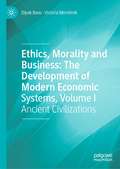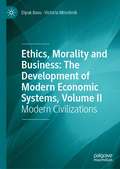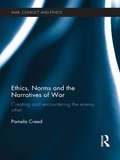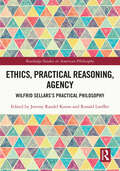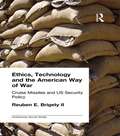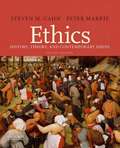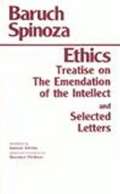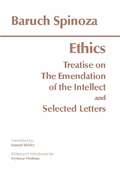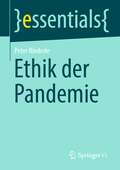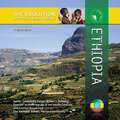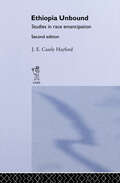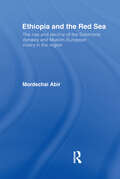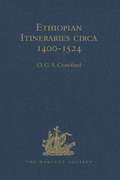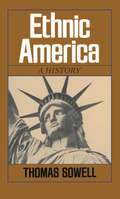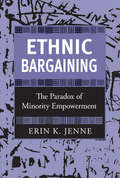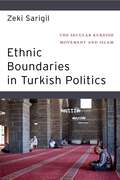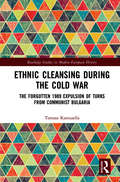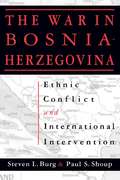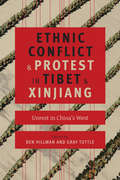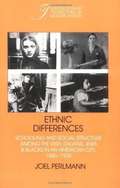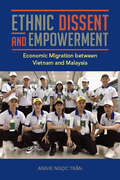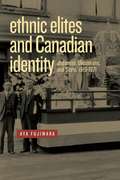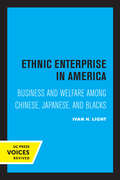- Table View
- List View
Ethics, Morality and Business: Ancient Civilizations
by Dipak Basu Victoria MiroshnikThis book, the first of two volumes, examines ancient civilizations to explore the ethical foundations of modern economic systems. The origin of ethical values is analyzed from a historical context and, through investigating the spread of the Aryan civilization from India into the rest of the world, the links between ancient Russia, India, Japan, and Greece are highlighted. By examining the business management in these societies, the development of an ethical system is explained.This book aims to highlight how trust is fundamental to transactions within an exchange economy. It will be relevant to those interested in economics, development studies, international relations, and global politics.
Ethics, Morality and Business: Modern Civilizations
by Dipak Basu Victoria MiroshnikThis book, the second of two volumes, is inspired by the famous philosopher of India, Kautilya, author of the first book on economics in the world, Arthashashtra. It analyzes the influence of ethical values from ancient societies on modern systems of management and economics. While this book deals with the “global sages” like Aristotle, Buddha, Jesus, the scope is also expanded to incorporate other notable modern thinkers like Karl Marx, Adam Smith, and Rabindranath Tagore. This book aims to highlight the interrelationships between ethics and management, both from a micro and macroeconomics, as well as organizational and national, perspective. It will be useful for those interested in history, economics, development studies, international relations, and global politics.
Ethics, Norms and the Narratives of War: Creating and Encountering the Enemy Other (War, Conflict and Ethics)
by Pamela CreedThis book examines the ethics and values that render a war discourse normative, and features the stories of American soldiers who fought in the Iraq War to show how this narrative can change. The invasion of Iraq, launched in March 2003, was led by the United States under the now discredited claim that Iraq was developing weapons of mass destruction (WMD). However, critical questions concerning what we may be able to learn from this experience remain largely unexplored. The focus of this book, therefore, is on soldiers as systems of war – and the internal battle many of them wage as they live a reality that slowly emerges as inconsistent with familiar beliefs and value commitments. This work offers a reflective study of identity struggle from the perspective of emotional psychology and delves into the ‘narrative field’ of socio-politics. Going beyond the political contestations over the U.S. military intervention in Iraq, the author analyses original research on the evolving beliefs and value-commitments of veterans of the war, exploring their faith in its ‘just cause’ and their personal sense of self and national identity. This book will be of much interest to students of the Iraq War, US foreign policy, military studies, discourse analysis, and IR in general.
Ethics, Practical Reasoning, Agency: Wilfrid Sellars’s Practical Philosophy (Routledge Studies in American Philosophy)
by Jeremy Randel Koons Ronald LoefflerThis is the first volume devoted exclusively to the practical philosophy of Wilfrid Sellars. It features original essays by leading Sellars scholars that examine his ethical theory, his theory of practical reasoning, and his theory of intentional agency. While most scholarship on Sellars’s philosophy has focused on his epistemology, metaphysics, or philosophy of language and mind, Sellars himself regarded his practical philosophy as central to his overall project of situating rational beings within the natural order. The chapters in this volume address this neglected area of Sellars’s philosophy. The chapters are divided into thematic sections covering Sellars’s theory of we-intentions – influential in contemporary debates on collective intentionality – naturalism and the manifest image, and the moral point of view. Together, they demonstrate how Sellars’s practical philosophy contributes to important debates in contemporary philosophy regarding, for example, expressivist approaches to moral thought and group agency in the collective intentionality literature. Ethics, Practical Reasoning, Agency: Wilfrid Sellars’s Practical Philosophy will appeal to scholars and advanced students interested in Wilfrid Sellars, American philosophy, and ethics.
Ethics, Technology and the American Way of War: Cruise Missiles and US Security Policy (Contemporary Security Studies)
by Reuben E. Brigety IIA new investigation into how the advent of precision-guided munitions affects the likelihood of US policy makers to use force. As such, this is an inquiry into the impact of ethics, strategy and military technology on the decision calculus of national leaders. Following the first Gulf War in 1991, this new study shows how US Presidents increasingly used stand-off precision guided munitions (or "PGMs", especially the Tomahawk cruise missile) either to influence foreign adversaries to make specific policy choices or to signal displeasure with their actions. Such uses of force are attractive because they can lead to desirable policy outcomes where conventional diplomacy has failed but without the large cost of lives, economic resources, or political capital that result from large-scale military operations. In a post-9/11 world, understanding alternative uses of force under significant policy constraints is still of supreme importance.
Ethics: History, Theory, and Contemporary Issues, Sixth Edition
by Steven M. Cahn Peter MarkieEthics: History, Theory, and Contemporary Issues, Sixth Edition, features fifty-nine selections organized into three parts, providing instructors with great flexibility in designing and teaching a variety of courses in moral philosophy. Spanning 2,500 years of ethical theory, the first part, Historical Sources, ranges from ancient Greece to the twentieth century and now includes the complete text of John Dewey's Theory of Valuation. The second part, Modern Ethical Theory, includes many of the most important essays of the past century. The discussion of varieties of normative ethics continues in the work of major contemporary philosophers, while landmark selections reflect concern with moral language and the justification of morality. In the third part, Contemporary Moral Problems, the readings present the current debates over abortion, euthanasia, famine relief, environmentalism, and the use of torture in interrogations, as well as essays on the trolley problem, death, and the meaning of life. One-third of the selections are authored by women. Wherever possible, each reading is printed in its entirety.
Ethics: With the Treatise on the Emendation of the Intellect, and Selected Letters
by Benedictus De SpinozaSince their publications in 1982, Samuel Shirley's translations of Spinoza's Ethics and Selected Letters have been commended for their accuracy and readability. Now with the addition of his new translation of Treatise on the Emendation of the Intellect this enlarged edition will be even more useful to students of Spinoza's thought. Foreward by Seymour Feldman.
Ethics: with The Treatise on the Emendation of the Intellect and Selected Letters
by Baruch Spinoza Seymour Feldman Samuel ShirleySince their publication in 1982, Samuel Shirley's translations of Spinoza's Ethics and Selected Letters have been commended for their accuracy and readability. Now with the addition of his new translation of Treatise on the Emendation of the Intellect this enlarged edition will be even more useful to students of Spinoza's thought.
Ethik der Pandemie (essentials)
by Peter RinderleDie Corona-Krise zwingt uns zu gewaltigen Veränderungen unserer privaten Lebensführung und erfordert höchst umstrittene politische Maßnahmen zum Schutz der Gesundheit und zur Verteilung knapper Ressourcen. Sie verlangt große Anstrengungen von den Wissenschaften, und sie hat nicht zuletzt erhebliche Auswirkungen auf die kulturelle Identität von Gemeinschaften. Dieses Büchlein gibt einen Überblick über die wichtigsten Fragen und Probleme, die eine globale Pandemie für die philosophische Ethik aufwirft. Nach einer Analyse des Begriffs und des Werts der Gesundheit präsentiert und bewertet es die prominentesten Lösungsvorschläge und soll mit einer Reflexion über die Forderungen der Gerechtigkeit und die Inhalte eines guten Lebens zur Orientierung unseres persönlichen und politischen Handelns beitragen.
Ethiopia (The Evolution of Africa's Major Nations)
by Jim CorriganEthiopia, unlike most African countries, remained mostly free from European colonial influence. This landlocked country in East Africa had been the site of a powerful ancient kingdom, which was overthrown by a military coup in 1974. A socialist government was established, under which millions of Ethiopians starved during the famines of the 1970s and 1980s. Rebel groups initiated a civil war and overthrew the government in 1991. Although Ethiopia adopted a new constitution in 1994 and held democratic elections the next year, the country is not truly a democracy. Instead, Ethiopia's government has been recognized as an authoritarian regime that uses force to stifle dissent. Ethiopia's economy grew rapidly in the late 2000s, but the country's people are among the poorest in Africa. In addition, a terrible drought in 2011 has caused a food crisis that threatens the lives of many people.
Ethiopia Unbound: Studies in Race Emancipation
by J.E.Caseley HayfordFirst published in 1969. Routledge is an imprint of Taylor & Francis, an informa company.
Ethiopia and the Red Sea: The Rise and Decline of the Solomonic Dynasty and Muslim European Rivalry in the Region
by Mordechai AbirFirst Published in 1980. An important waterway for international trade, the Red Sea is about 2000 kms. long and generally between 200-300 kms. wide. In its southern part the Arabian peninsula approaches the Horn of Africa to a distance of about 25 kms. This book is partly the outcome of research for the chapter called 'Ethiopia and the Horn of Africa' (from the middle of the sixteenth century until the middle of the eighteenth century), published in the fourth volume of the Cambridge History of Africa. The extensive research conducted for several summers between 1967 and 1971 for a forty-page chapter resulted in substantial material in order to create this volume.
Ethiopian Itineraries circa 1400-1524: Including those Collected by Alessandro Zorzi at Venice in the Years 1519-24 (Hakluyt Society, Second Series)
by O. G. S. CrawfordZorzi's Italian text with translation by C. A. Ralegh Radford. Includes a gazetteer for Fra Mauro's map. This is a new print-on-demand hardback edition of the volume first published in 1958.
Ethnic America: A History
by Thomas SowellThis classic work by the distinguished economist traces the history of nine American ethnic groups--the Irish, Germans, Jews, Italians, Chinese, African-Americans, Puerto Ricans, and Mexicans.
Ethnic Americans: A History of Immigration
by Leonard DinnersteinFor more than three decades, Ethnic Americans has been hailed as a classic history of immigration to America. Leonard Dinnerstein and David M. Reimers begin with a brief overview of immigration during the colonial and early national eras (1492 to the 1820s), focusing primarily on the arrival of English Protestants, while at the same time stressing the diversity brought by Dutch, French, Spanish, and other small groups, including "free people of color" from the Caribbean. Next they follow large-scale European immigration from 1830 to the 1880s. Catholicism became a major force in America during this period, with immigrants-five million in the 1880s alone-creating a new mosaic in every state of the Union. This section also touches on the arrival, beginning in 1848, of Chinese immigrants and other groups who hoped to find gold and get rich. Subsequent chapters address eastern and southern European immigration from 1890 to 1940; newcomers from the Western Hemisphere and Asia who arrived from 1840 to 1940; immigration restriction from 1875 to World War II; and the postwar arrival and experiences of Asian, Mexican, Hungarian, and Cuban refugees. Taking the past fifteen years into account, the fifth edition of Ethnic Americans considers recent influxes of Asians and Hispanics, especially the surge in the Mexican population, and includes expanded coverage of nativist sentiment in American politics and thought.
Ethnic Americans: Immigration and American Society, fifth edition
by David M. Reimers Leonard DinnersteinFor more than three decades, Ethnic Americans has been hailed as a classic history of immigration to America. Leonard Dinnerstein and David M. Reimers begin with a brief overview of immigration during the colonial and early national eras (1492 to the 1820s), focusing primarily on the arrival of English Protestants, while at the same time stressing the diversity brought by Dutch, French, Spanish, and other small groups, including "free people of color" from the Caribbean. Next they follow large-scale European immigration from 1830 to the 1880s. Catholicism became a major force in America during this period, with immigrants—five million in the 1880s alone—creating a new mosaic in every state of the Union. This section also touches on the arrival, beginning in 1848, of Chinese immigrants and other groups who hoped to find gold and get rich. Subsequent chapters address eastern and southern European immigration from 1890 to 1940; newcomers from the Western Hemisphere and Asia who arrived from 1840 to 1940; immigration restriction from 1875 to World War II; and the postwar arrival and experiences of Asian, Mexican, Hungarian, and Cuban refugees. Taking the past fifteen years into account, the fifth edition of Ethnic Americans considers recent influxes of Asians and Hispanics, especially the surge in the Mexican population, and includes expanded coverage of nativist sentiment in American politics and thought.
Ethnic Bargaining: The Paradox of Minority Empowerment
by Erin K. JenneIn Ethnic Bargaining, Erin K. Jenne introduces a theory of minority politics that blends comparative analysis and field research in the postcommunist countries of East Central Europe with insights from rational choice. Jenne finds that claims by ethnic minorities have become more frequent since 1945 even though nation-states have been on the whole more responsive to groups than in earlier periods. Minorities that perceive an increase in their bargaining power will tend to radicalize their demands, she argues, from affirmative action to regional autonomy to secession, in an effort to attract ever greater concessions from the central government.The language of self-determination and minority rights originally adopted by the Great Powers to redraw boundaries after World War I was later used to facilitate the process of decolonization. Jenne believes that in the 1960s various ethnic minorities began to use the same discourse to pressure national governments into transfer payments and power-sharing arrangements. Violence against minorities was actually in some cases fueled by this politicization of ethnic difference.Jenne uses a rationalist theory of bargaining to examine the dynamics of ethnic cleavage in the cases of the Sudeten Germans in interwar Czechoslovakia; Slovaks and Moravians in postcommunist Czechoslovakia; the Hungarians in Romania, Slovakia, and Vojvodina; and the Albanians in Kosovo. Throughout Ethnic Bargaining, she challenges the conventional wisdom that partisan intervention is an effective mechanism for protecting minorities and preventing or resolving internal conflict.
Ethnic Boundaries in Turkish Politics: The Secular Kurdish Movement and Islam
by Zeki SarigilThe Kurdish Movement in Turkey’s growing alliance with Islam One of the fault lines of Turkish politics traditionally has been the divide between religious and secular movements. However, as Zeki Sarigil argues, the secular Kurdish movement in Turkey has increasingly become aligned with Islam. As a result, Islam has become part of the movement’s political discourse, strategies and actions. Ethnic Boundaries in Turkish Politics traces the evolving relations between the leftist, secular Kurdish movement and Islam, from an apathetic and/or antagonistic attitude in the 1970s and 1980s to an increasingly Islam-friendly approach in the 1990s to an attitude of accommodation and the rise of Kurdish-Islamic synthesis in the early 2000s. Based on 104 interviews in several provinces in Turkey (primarily Ankara, Diyarbakir, Istanbul, and Tunceli) between 2011 and 2015 as well as ethnographic data, public opinion surveys and statements from the Kurdistan Workers’ Party (PKK) and Kurdish leaders, Sarigil shows how the secular Kurdish movement increasingly has been endorsing Islam and Islamic actors. The reasons for this Islamic opening are global, national, and local; Sarigil demonstrates that a group of strategic and ideological factors have encouraged and/or forced Kurdish leaders to redraw symbolic and social boundaries of the movement. Namely, with the end of the Cold War support for Marxist ideas collapsed, creating increasingly more favorable responses towards religion. In addition, the movement’s need to expand its social basis and popularity; electoral politics; and legitimacy struggles against rival political actors were other major factors, which triggered the Kurdish movement’s boundary expansion (i.e. its Islamic opening). The study also shows that the Kurdish boundary making was not without any tension or contestation. The boundary expansion by Kurdish ethnopolitical elites triggered both internal and external boundary contestations. The movement’s embrace of Islam on a more widespread level has major ramifications for politics in Turkey and in the region. Ethnic Boundaries in Turkish Politics has important insight into the PKK, modern Turkish and Islamic societies and highlights the increasing role of Islam in global politics.
Ethnic Cleansing During the Cold War: The Forgotten 1989 Expulsion of Turks from Communist Bulgaria (Routledge Studies in Modern European History)
by Tomasz KamusellaIn mid-1989, the Bulgarian communist regime seeking to prop up its legitimacy played the ethnonational card by expelling 360,000 Turks and Muslims across the Iron Curtain to neighboring Turkey. It was the single largest ethnic cleansing during the Cold War in Europe after the wrapping up of the postwar expulsions (‘population transfers’) of ethnic Germans from Central Europe in the latter half of the 1940s. Furthermore, this expulsion of Turks and Muslims from Bulgaria was the sole unilateral act of ethnic cleansing that breached the Iron Curtain. The 1989 ethnic cleansing was followed by an unprecedented return of almost half of the expellees, after the collapse of the Bulgarian communist regime. The return, which partially reversed the effects of this ethnic cleansing, was the first-ever of its kind in history. Despite the unprecedented character of this 1989 expulsion and the subsequent return, not a single research article, let alone a monograph, has been devoted to these momentous developments yet. However, the tragic events shape today’s Bulgaria, while the persisting attempts to suppress the remembrance of the 1989 expulsion continue sharply dividing the country’s inhabitants. Without remembering about this ethnic cleansing it is impossible to explain the fall of the communist system in Bulgaria and the origins of ethnic cleansing during the Yugoslav wars. Faltering Yugoslavia’s future ethnic cleansers took a good note that neither Moscow nor Washington intervened in neighboring Bulgaria to stop the 1989 expulsion, which in light of international law was then still the legal instrument of ‘population transfer.’ The as yet unhealed wound of the 1989 ethnic cleansing negatively affects the Bulgaria’s relations with Turkey and the European Union. It seems that the only way out of this debilitating conundrum is establishing a truth and reconciliation commission that at long last would ensure transitional justice for all Bulgarians irrespective of language, religion or ethnicity.
Ethnic Conflict and International Intervention: Crisis in Bosnia-Herzegovina, 1990-93
by Steven L. Burg Paul S. ShoupThis book examines the historical, cultural and political dimensions of the crisis in Bosnia and the international efforts to resolve it. It provides a detailed analysis of international proposals to end the fighting, from the Vance-Owen plan to the Dayton Accord, with special attention to the national and international politics that shaped them. It analyzes the motivations and actions of the warring parties, neighbouring states and international actors including the United States, the United Nations, the European powers, and others involved in the war and the diplomacy surrounding it. With guides to sources and documentation, abundant tabular data and over 30 maps, this should be a definitive volume on the most vexing conflict of the post-Soviet period.
Ethnic Conflict and Protest in Tibet and Xinjiang: Unrest in China's West (Studies of the Weatherhead East Asian Institute, Columbia University)
by Ben Hillman Gray TuttleDespite more than a decade of rapid economic development, rising living standards, and large-scale improvements in infrastructure and services, China's western borderlands are awash in a wave of ethnic unrest not seen since the 1950s. Through on-the-ground interviews and firsthand observations, the international experts in this volume create an invaluable record of the conflicts and protests as they have unfolded—the most extensive chronicle of events to date. The authors examine the factors driving the unrest in Tibet and Xinjiang and the political strategies used to suppress them. They also explain why certain areas have seen higher concentrations of ethnic-based violence than others.Essential reading for anyone struggling to understand the origins of unrest in contemporary Tibet and Xinjiang, this volume considers the role of propaganda and education as generators and sources of conflict. It links interethnic strife to economic growth and connects environmental degradation to increased instability. It captures the subtle difference between violence in urban Xinjiang and conflict in rural Tibet, with detailed portraits of everyday individuals caught among the pressures of politics, history, personal interest, and global movements with local resonance.
Ethnic Differences: Schooling And Social Structure Among The Irish, Italians, Jews, And Blacks In An American City, 1880-1935 (Interdisciplinary Perspectives On Modern History)
by Stephan Thernstrom Joel Perlmann Robert FogelEthnic Differences, first published in 1989, explores how and why the Irish, Italians, Jews, and blacks of Providence, Rhode Island differed in their schooling and economic success. Drawing on evidence from thousands of students records of public, Catholic, and private schools, as well as on census manuscripts, city directories, and other sources, the book offers an integrated study of American ethnicity, education, and social structure. Joel Perlmann examines the extent to which differing career patterns, and reconsiders the relation between ethnicity and social class.
Ethnic Dissent and Empowerment: Economic Migration between Vietnam and Malaysia (Studies of World Migrations)
by Angie Ngoc TranVietnam annually sends a half million laborers to work at low-skill jobs abroad. Angie Ngọc Trần concentrates on ethnicity, class, and gender to examine how migrant workers belonging to the Kinh, Hoa, Hrê, Khmer, and Chãm ethnic groups challenge a transnational process that coerces and exploits them. Focusing on migrant laborers working in Malaysia, Trần looks at how they carve out a third space that allows them a socially accepted means of resistance to survive and even thrive at times. She also shows how the Vietnamese state uses Malaysia as a place to send poor workers, especially from ethnic minorities; how it manipulates its rural poor into accepting work in Malaysia; and the ways in which both countries benefit from the arrangement. A rare study of labor migration in the Global South, Ethnic Dissent and Empowerment answers essential questions about why nations export and import migrant workers and how the workers protect themselves not only within the system, but by circumventing it altogether.
Ethnic Elites and Canadian Identity: Japanese, Ukrainians, and Scots, 1919-1971
by Aya FujiwaraEthnic elites, the influential business owners, teachers, and newspaper editors within distinct ethnic communities, play an important role as self-appointed mediators between their communities and “mainstream” societies. In Ethnic Elites and Canadian Identity, Aya Fujiwara examines the roles of Japanese, Ukrainian, and Scottish elites during the transition of Canadian identity from Anglo-conformity to ethnic pluralism. By comparing the strategies and discourses used by each community, including rhetoric, myths, collective memories, and symbols, she reveals how prewar community leaders were driving forces in the development of multiculturalism policy. In doing so, she challenges the widely held notion that multiculturalism was a product of the 1960s formulated and promoted by “mainstream” Canadians and places the emergence of Canadian multiculturalism within a transnational context.
Ethnic Enterprise in America: Business and Welfare among Chinese, Japanese, and Blacks
by Ivan LightThis title is part of UC Press's Voices Revived program, which commemorates University of California Press’s mission to seek out and cultivate the brightest minds and give them voice, reach, and impact. Drawing on a backlist dating to 1893, Voices Revived makes high-quality, peer-reviewed scholarship accessible once again using print-on-demand technology. This title was originally published in 1972.
